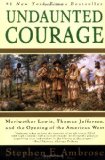Book Review: “Undaunted Courage” by Stephen E. Ambrose
March 20, 2011
Ambrose, like many biographers before him, is a man enamored of his subject. To him, Meriwether Lewis is the paramount, curious, bootstrapped Renaissance man of the early 19th century; this bosom buddy of Thomas Jefferson is the bold Yin to William Clark’s relevant but slightly duller Yang. His biographic sweep of Lewis primarily concerns the exhilarating rawness of the journey of the Corps of Discovery during 1804-1806, but it is at its core a story about the man, not merely the events for which he is yet championed.
At its core, this is not a new story. As a child of the Pacific Northwest—I in fact grew up within walking distance of the explorers’ eponymous college—I’m steeped in this history, which around here almost has a mythic ring to it. I’ve read the journals (Penguin Classics; ed. Frank Bergon) and the crib-like compressed edition, The Essential Lewis and Clark (ed. Landon Y. Jones). Our close family friend cum former history professor wrote a book on the lasting cultural impact of the duo and the passing of the 200 year mark since they put their white feet on Northwest soil.
Without being able to re-invent history, what Ambrose does here is two-fold. One, though the account he gives is necessarily in line with what’s in the journals, he gives a modern-edited rollicking flick to the narrative, lending it a momentum that landed the book at the #1 spot on the New York Times Bestseller List. Two, he bookends the story with early- and (tragic) late-life vignettes of his hero, aiming to round out what we know about Lewis, thus stretching the story of his life larger than solely the adventurer’s journey.
Ambrose takes time to introduce us to young Lewis, his firebrand mother, his rustic rearing, his capacity for and interest in intellectual self-improvement. We get to watch him establish himself with Jefferson and make Smart Youthful Choices that put him in line to lead the long-shot expedition to the Pacific coast.
It’s the later-life pieces that still feel fragmentary. Lewis, robust and stalwart on the expedition, makes a sudden turn for the melancholy and incompetent. His post as governor of the Louisiana Territory goes sloppy from the get-go, as Lewis falls into debt, likely into heavy opiate and alcohol abuse, and what seems to our modern eyes like some deep mental health grief. We don’t have the luxury of understanding exactly how this happened. Lewis is mum on the situation for the most part—one of the symptoms of his decline is that he stops writing people back, or writing at all. Ambrose puts together the pieces where he can. He looks for hints in fragmentary documentation. But the chips are stacked against him: there just isn’t much existing material to dig through. Colleagues comment on Lewis’ “madness”; government officials refuse to back his spending; he is heaped in shame—this we know. But the end story is far less fleshed out than the early story, and leaves us with a shroud of mystery that is likely eternal.
That Ambrose paints Lewis’ portrait with an occasionally starry-eyed luster is not surprising. It’s almost as if he’s a tiny bit in love with Lewis. One can feel Ambrose’s sadness as Lewis’ behavior becomes more erratic, his confusion and shock at Lewis’ eventual awful suicide. Through the bracing days of the expedition, Ambrose’s admiration is palpable—here is a biographer who maintains a steady commitment to the man he has brought to life.
Related Posts
- Book Review: “The Lost City of Z” by David Grann
April 27, 2010 - Book Review: “Genghis Khan and the Making of the Modern World” by Jack Weatherford
February 3, 2010 - Book Review: “Half Moon: Henry Hudson and the Voyage that Redrew the Map of the New World” by Douglas Hunter
December 21, 2009 - Book Review: "Names on the Land" by George R. Stewart
January 20, 2009 - Book Review: “1491″ by Charles Mann
January 4, 2010

